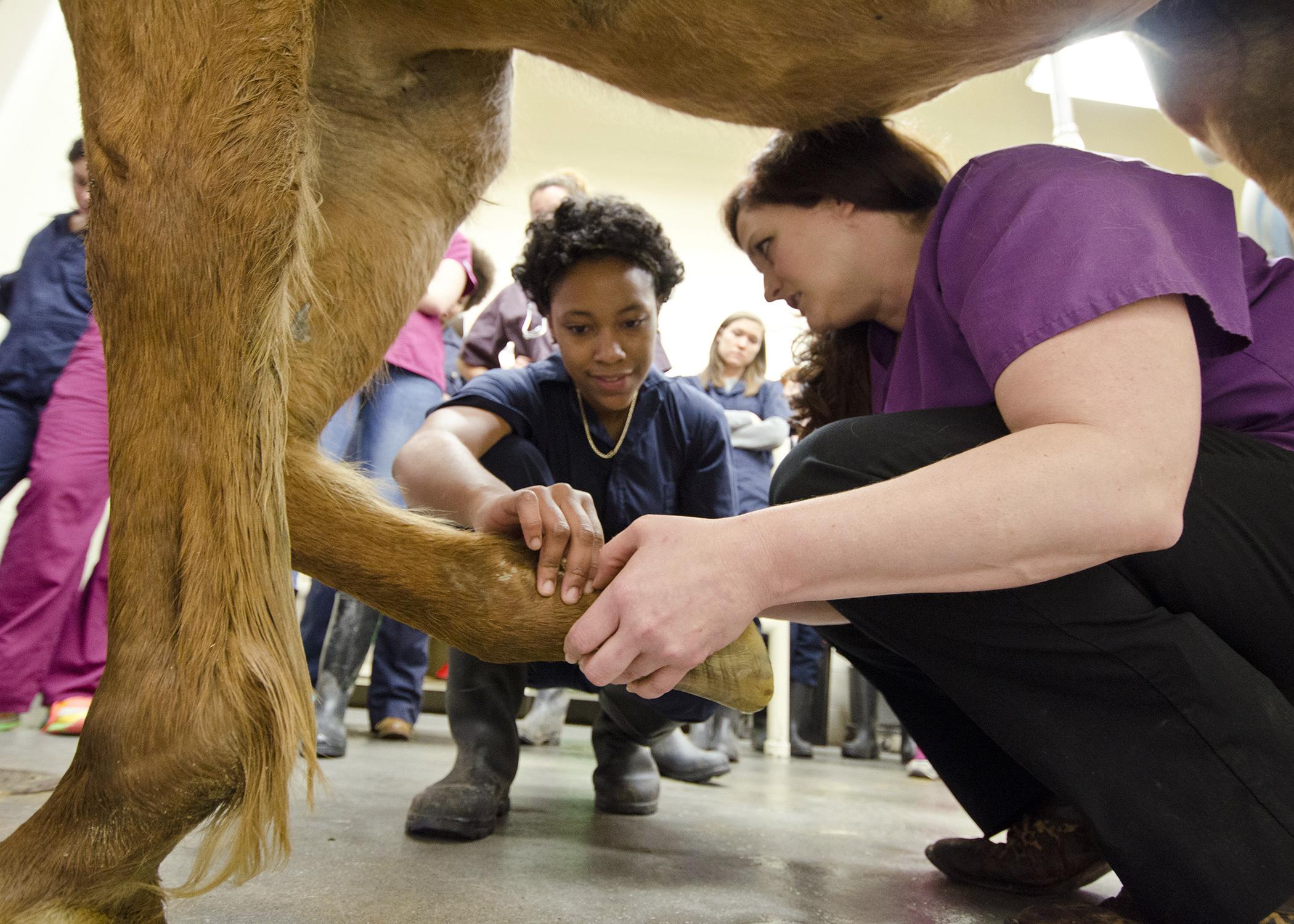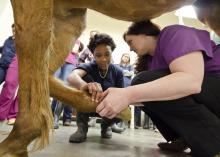Information Possibly Outdated
The information presented on this page was originally released on October 9, 2015. It may not be outdated, but please search our site for more current information. If you plan to quote or reference this information in a publication, please check with the Extension specialist or author before proceeding.
MSU vet tech program provides new experiences
By Karen Templeton
MSU College of Veterinary Medicine
STARKVILLE, Miss. -- The Mississippi State University College of Veterinary Medicine is celebrating National Veterinary Technician Week October 11-17 by recognizing this growing program and the graduates who have found careers in the dynamic animal health field.
The MSU-CVM four-year undergraduate program leading to a Bachelor of Science degree in veterinary medical technology began in the fall of 2010. The college established the program to address the national shortage of veterinary technologists and to provide the highest standard of health care to animals and the public.
MSU-CVM’s veterinary technology program is one of only three associated with a veterinary college. Educating veterinary technologists alongside veterinary students benefits all those involved.
“The students in our program have access to all of the latest veterinary medical tools and technology,” said Dr. Allison Gardner, director of the VMT program. “For instance, they are using the most up-to-date rehabilitation tools, and they also get to work with boarded specialists. It’s a really unique experience.”
Students must complete all university core curriculum coursework and become eligible for one of the 30 slots available for each class. Interested students meet with MSU-CVM clinical instructors during their first two years as undergraduates to ensure they are meeting the requirements and completing the appropriate coursework before they move to MSU-CVM to complete their third and fourth years.
“The program has really grown,” Gardner said. “Originally, we were recruiting students from the MSU undergraduate population. That continues, but we are now seeing students choose MSU because of our VMT program.”
One such student is Jannah Iles from Slidell, Louisiana. Iles attended the college’s Veterinary Camp as a high school student originally intending to one day become a veterinarian.
“Vet Camp introduced me to veterinary technology, and I knew it was for me,” Iles said. “I loved learning that vet techs can focus on areas like physical therapy. I was just so impressed with what I learned about the field that I knew I wanted to be a part of it.”
Iles knew that a four-year veterinary technology program at a veterinary college would provide her with the skills and experience she desired.
“A four-year program gives students a chance to really experience it all,” she said. “The more you know, the more you can do. I am still working on my university core classes, but have already gotten so much from the prerequisites. I know that my two years at MSU-CVM will really prepare me.”
The program has also attracted students from Illinois, Michigan, Texas and Puerto Rico.
To meet the interests of the expanding and increasingly more diverse classes, Gardner and her team are offering more hands-on experiences.
“We have started taking groups of VMT students to two local animal shelters,” Gardner said. “They get to use skills such as nail trimming, administering vaccinations, and assisting in physical exams. Additionally, they are providing the animals with social enrichment by bathing and grooming them, and even just playing with them.”
Gardner said veterinary technologists have a real opportunity to not only help treat patients, but also provide them with social enrichment.
“Vet techs work hand-in-hand with the veterinarian and often, they’ll be the ones to be with the patients during diagnostics and treatments, maybe even right after a surgical procedure,” she said. “I think vet techs have such a nice opportunity in their jobs to provide a lot of nurturing. I can see how our students like that aspect of it.”
New to the program is a 3-week clinical elective in a specialty area such as intensive care, internal medicine, equine medicine, food animal medicine, and theriogenology, which addresses animal reproduction.
“Just like the Doctor of Veterinary Medicine students, the veterinary technology group can choose areas they have a particular interest in to learn more about it,” said Gardner.
Brittany Vannoy, a 2013 graduate of the program, will complete her certification to specialize in internal medicine this fall. She has worked as a veterinary technologist with the Memphis Veterinary Specialists clinic.
“I learned about veterinary technology as a freshman,” Vannoy said. “I love how the program offers a Bachelor of Science. I feel like everything I experienced there helped prepare me for my current job.”
The program has achieved 100 percent job placement, and graduates like Vannoy are finding that their four years in the MSU-CVM program introduced them to experiences that make them good job candidates.
“We weren’t just observers in the program,” Vannoy said. “We always got to participate in cases, ones that I considered interesting and an important part of my education. I was running anesthesia under careful guidance, and I came into my current job ready and able to do that more confidently.”
Gardner said students are enjoying other new aspects of the program such as four-week externships in which they get to even further explore their interests and tailor their skills.
“The students’ interests grow, and so we try to stay ahead to give them the experience and skills they want and need,” Gardner said. “A dynamic experience is what we want to provide so they can be ready for a field that’s really advancing.”
Contact: Karen Templeton, 662-325-1100



